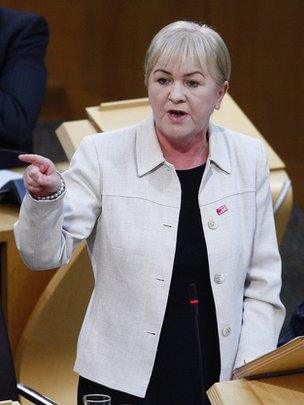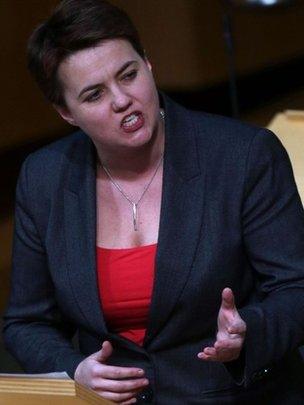Scottish independence: Pop and politics at Holyrood
- Published
Rather wisely, our leaders are generally leery of mingling too readily with the world inhabited by popular beat combos.
Pop and politics, experience teaches them, do not always mix.
Think Tony Blair and Britpop. Think Gordon Brown and Arctic Monkeys. Think Ronald Reagan and Bruce Springsteen (those lyrics to Born in the USA).
And so at Holyrood the front benches cautiously doffed their caps in the general direction of David Bowie who has apparently concluded that the UK is just Hunky Dory.
"Scotland, stay with us" was his plea at the Brits - or, rather, the plea delivered on his behalf.

Party leaders jostled to quote from David Bowie's lyrics
Alex Salmond got his retaliation in first.
Rising to answer his first formal question, he praised the efforts of our curlers at the Winter Olympics - before drily quoting the Thin White Duke himself in suggesting it proved "we could be heroes - just for one day."
If Johann Lamont was in any way exasperated at being thus pre-empted, she hid it well. She advised Mr Salmond to "turn and face the strain" occasioned by his policies.
The hip among you (c'mon, there must be some out there) will have spotted another Bowie lyric.
So was that it then? Did they continue indulging in Bowie-mania for the remainder of the session - or gig, as we should now call it?
They did not. Rather they resorted to more familiar political lingo: insults.
To be precise, each accused the other of insulting: a) their rivals; b) the people; c) intelligence.

Johann Lamont asked about the cost to businesses in an independent Scotland
At one point, Ms Lamont became distinctly angry and emoted.
How could Alex Salmond continue to talk about a currency union when the party of the other part (the UK) refused to deal?
"What," she declared repeatedly, glaring at the FM, "do you not understand?"
Ms Lamont also filled in a few figures for the FM.
Regular readers of this blog (the achingly hip and those with aching hips, alike) will know that Scottish ministers have declined to tally up the transaction costs which might affect Scottish businesses in the event of a different currency north and south of the Border.
This despite their readiness to count up the cost for the remainder of the UK, rUK.
The Labour leader said that Scotland would suffer much more than rUK, per capita.
In response, Mr Salmond noted that he favoured a currency union - which would pre-empt such problems for both sides.
Then the FM turned to a poll in the Daily Mail - which he billed "Labour's house journal".
It would be, he said, the only time he would quote from the Mail. He then proceeded cheerfully to cite the paper three times, plainly enthused by the findings.
Voting intention
The survey had indicated, he reported, that the "No" camp's lead had declined in the aftermath of George Osborne's declaration that a currency union was something up with which he would not put.
Further, it suggested a lead for the SNP in both Westminster and Holyrood voting intention.
It all proved, according to Mr Salmond, that the currency issue had backfired upon the unionists - and that Labour would suffer from an association with George Osborne and the Tories.
To Ruth Davidson, then, of said Tories.

Ruth Davidson said the first minister was "an emperor with no clothes"
The sand, she reckoned, was shifting beneath Mr Salmond's feet. He was, apparently, weak on the currency, weak on pensions and weak on the Euro. He was an emperor with no clothes.
The fully-clothed emperor arose, seemingly on solid ground - and advised Ms Davidson to "draw a line in the sand".
Those who wear anoraks rather than metrosexual tabards will spot a lyric from Davidson, R. in her leadership contest period.
And so Willie Rennie had a bash.
The Liberal Democrat leader reckoned that the FM's poker face was bogus. George Osborne et al might not be bluffing.
Should not the first minister face the prospect that Scotland required a Plan B on the currency? Would he be kind enough to share the secret?
As is often his wont, the FM seized upon one word. Might? Might?
Was Willie Rennie suggesting that the Osborne declaration was anything less than firm?
I suspect not: rather Mr Rennie was inviting the FM to consider the possibility that he might not achieve his objective of a currency union.
Still, it was sufficient for Mr Salmond. He restated his firm anticipation that a sterling zone would be established in the event of Scottish independence.
And, after a few more exchanges, the FM was off - no doubt to check his gramophone collection, excising certain former favourites.